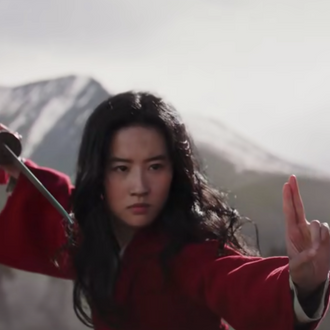
Ever since the release of Disney’s live-action Mulan on its Disney+ streaming platform on September 4, the hashtag #BoycottMulan has been trending on Twitter, and it hasn’t been coming from disgruntled Ping-Shang shippers or parents who don’t want to pay $30 for VOD. The #BoycottMulan movement began last summer, when its star, Chinese American actress Liu Yifei, shared a Weibo post supporting the Hong Kong police, who had been exercising violence and brutality against pro-democracy protesters.
Now, after Mulan’s digital release and in anticipation of its theatrical release in parts of Asia, activists in Hong Kong, Thailand, and Taiwan are spreading the #BoycottMulan message, as are their supporters from around the world. The Hollywood Reporter writes, the “protestors have deployed the hashtag to symbolize their shared pro-democratic mission and concerns over China’s growing influence over the region. In recent weeks, Thailand has been roiled by street protests as thousands of young people call for reforms of the country’s monarchy.” In July, student protesters in Seoul, South Korea, also protested Mulan, saying Yifei had made the film “come to symbolize support for political violence rather than the progressive values of the movie’s themes.” Hong Kong activist Joshua Wong has been a prominent figure online in the #BoycottMulan movement.
Film writer Jingan Young wrote about the controversy surrounding Mulan for the Guardian and tweeted her support of the hashtag, calling the film “loyal, brave and true to CCP.” Young’s essay clarifies that the controversy is not only about Yifei’s pro-police social-media activity, but also because the film was partially shot in Xinjiang, a region where Uighurs are persecuted by the Chinese government.
Activist Nathan Law supports the movement.
As does Hong Kong parliamentarian Ray Chan.
Whether or not you choose to stream Mulan this Labor Day, Kyne from Canada’s Drag Race won’t be watching.


